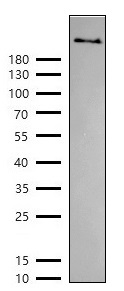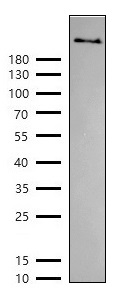ACC antibody
Catalog Number:
- 产品信息
- 相关图片
- 常见问题
|
Basic infomation |
source |
Mouse |
|
Clonality |
Polyclonal |
|
|
Isotype |
IgG |
|
|
Reactivity |
H M R |
|
|
MW (kDa) |
97kDa |
|
|
Purification |
Antigen affinity purfication |
|
|
UniProt ID |
Q13085 |
|
|
NCBI Gene |
31 |
|
|
|
|
|
|
Applications |
Tested Applications |
WB, |
|
Cited Applications |
WB, IHC, IF |
|
|
Product Usage Information |
Western Blotting |
1:500-1:2000 |
|
Immunohistochemistry |
1:200-1:400 |
|
|
Immunofluorescence |
1:200-1:400 |
|
|
|
|
|
|
Storage |
PBS with 50% glycerol and less than 0.02% sodium azide |
|
|
Store at –20°C, stable for one year after shipment |
||
|
Do not aliquot the antibody |
||
|
|
||
|
Background |
Acetyl-CoA carboxylase (ACC) is a complex multifunctional enzyme system. ACC is a biotin-containing enzyme which catalyzes the carboxylation of acetyl-CoA to malonyl-CoA, the rate-limiting step in fatty acid synthesis. There are two ACC forms, alpha and beta, encoded by two different genes. ACC-alpha is highly enriched in lipogenic tissues. The enzyme is under long term control at the transcriptional and translational levels and under short term regulation by the phosphorylation/dephosphorylation of targeted serine residues and by allosteric transformation by citrate or palmitoyl-CoA. |
|
|
|
|
|
|
Abbreviation |
H: human M: mouse R: rat Rb: rabbit Hm: hamster Mk: monkey Vir: virus C: chicken Z: zebrafish Dg: dog Pg: pig Hr: horse |
|
|
|
Western blot - ACC antibody at 1/1000 dilution Lane 1: HEK-293 whole cell lysate Secondary: HRP-Conjugated Goat Anti-mouse IgG (H+L) at 1/10000 dilution |
|
|
|
|
|
|
|
|
|




 返回列表
返回列表